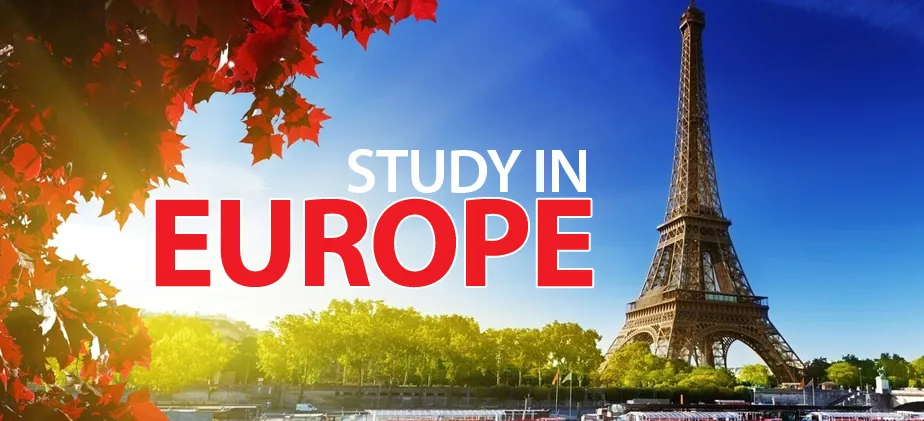STUDY IN OTHER EUROPEAN COUNTRIES

The educational system in Europe is one of the oldest and most popular in the world. To study in other European Countries like Poland, Luxembourg, Finland, Sweden, Italy, Norway, France, Cyprus, Denmark and so on, you need to know about the Educational System in
EUROPE
Europe offers international Bachelor’s, Master’s, and PhD Degrees in a wide variety of fields and programmes. A growing number of European Higher Educational Institutions offer International study programmes with English as the main language of instruction and there are very few programmes which do not offer English-taught Degree Programmes. Studying in Europe now has become particularly advantageous, as programmes in English are common in the areas of Business, Management, Science, and Engineering. Any foreign student, who wants to study in Europe, can also follow study programmes in other European languages like German, French, Dutch, Swedish, Finnish, Danish, Norwegian, Greek, Spanish, Italian, or Portuguese. Provided that, they have sufficient knowledge of that language.
One salient aspect of European study programmes is the project called Erasmus. Erasmus (“European Community Action Scheme for the Mobility of University Students”) is the European Commission’s Educational Programmes for higher education students, teachers and institutions. Erasmus involves Student’s mobility, Teacher’s mobility, and curriculum development. This is based on cooperation and agreement among Higher Educational Institutions in different participating countries.
BELGIUM
Belgium is officially the Kingdom of Belgium and is situated in Northwest Europe. It is one of the founding members of the European Union and hosts its headquarters, as well as those of other major International Organizations, including NATO. It is considered to be the 15th largest Trading Nation in the world. Belgium’s economy is an open economy which is highly service-oriented and is based on the export of automobiles, iron, steel, diamond, finished goods, textiles, plastic, petroleum, and non-ferrous metals.
Education is compulsory from the age of six to eighteen for Belgians. An estimated 95% of the adult population is literate; and the Programme for International Student’s Assessment, coordinated by the OECD, currently ranks Belgium’s education as 19th in the world, significantly higher than the average.
Study Visa in Europe.
Documents to be submitted
For a study-related and work in Belgium, you must apply for a Temporary Residence Permit for Study (Autorisation de Séjour Provisoire pour études/Machtiging tot Voorlopig Verblijf voor studies) from the Belgian Embassy. You must submit the following documents with Esgoldents for a successful Visa Application.
Note: You can contact us if any of the stated required documents to process your Visa are not available:
- A Passport valid for three months longer than the Visa.
- A Visa Application Form was correctly filled in and signed together with two recent passport photos.
- Proof of registration for a full course in a higher educational establishment for Belgium Students.
- The guarantor who signs this pledge of financial support must have adequate means of subsistence and stand surety for any costs incurred by the student in terms of health treatment, residence in Belgium and repatriation, for at least one academic year.
A Medical Certificate is obtained from the doctor designated by the Belgian Embassy or Consulate.
A certificate of good conduct if you are over 21 (or 18 if you are going to study at a private educational establishment) dating from no more than six months prior to the date of application and covering the past year.
Proof of transport arrangements (return ticket): as soon as your visa application has been approved, you must submit a return ticket (in your name and non-transferable) in order for the Visa to be issued. You only need submit the return ticket and Travel Insurance Policy once the Belgian Embassy or Consulate informs you that your Visa has been granted. This is to avoid unnecessary expense on your part. However, the Embassy or Consulate may ask you to submit proof that a return ticket has been reserved.
The documents listed above are only the basic documents to be submitted in all cases. Additional documents may be requested by the Embassy or Consulate.
FRANCE.
Types of Student Visas in France.
A Student’s Identification Card is required for those Students who are not French citizens and are planning to study in France for more than 3 Months. There are different categories of Student’s Visa available: They are;
Étudiant-Concours Visa: It allows a maximum stay of 90 days. It is used by Students who have to attend an entrance exam, undergo a short Course or just to visit the University before applying.
Long Stay Visa: It expires in three months but can be renewed as and when required.
Residence Permit (or Carte de Séjour): It is given for one academic Year and is renewable. It is handed out by the Prefecture de police of the residential area.
Temporary Long Stay Visa: It is for 4 to 6 months, but a residence permit will not be given.
Student Work Permits in France.
Students are allowed a Student-working Visa for extra income. During the academic session, 10-20 hours of work per week are allowed. During summer vacations, 20-39 hours per Week are permitted for work. There is a range of opportunities for students who want to apply for a Student -work Visa in France. However, teaching would be the best option since it pays well, comparatively.
Student Visa Interview: Some Particulars.
The Student Visa Interview is a crucial part of the application process. The Student should remember to fix the interview date well in advance as a lot of interview requests are received by the office regularly. It is essential to carry all original documents to the interview as they will be verified at the office on the same day. A designated officer of the Embassy of France will carry out the interview for getting a Student Visa. The Consulates in Mumbai or Pondicherry is also authorized to conduct the interview.
Documents are required for the French Students’ Visa Application.
All documents should be accompanied by two duplicate copies of each.
- Proof of admission to a French University.
- Proof of adequate funds to cover living expenses at the rate of 415 Euros per month, for an academic year or till when the course ends. Another option is showing a Sponsorship Letter for apartment accommodation and documents showing the availability of at least 205 Euros per Month as living expenses, for an academic year or for the entire studies abroad academic Course.
- Copies of academic Degrees/Diplomas as well as a concise CV along with 3 passport size photographs.
- Two sets of photocopies of relevant pages of a passport valid for the entire stay.
- Plane reservation or air tickets. A minimum repatriation cover of 3,000 Euros is necessary as is a short subscription for a medical insurance policy.
The Netherlands.
Work Permit.
A PhD student is treated as an employee of the University, and not a ‘Student’. This is because all kinds of research are deemed to be ‘work’ by law in the Netherlands. Other students have to apply for a Work Permit in case he/she wants to work. Work should be of academic persuasions, like lecturing, research, and student internship. On holding a residence visa, one is allowed to work for maximum of 10 hours per Week or work should be of a seasonal nature. The employer, in this case, must apply for the requisite Student’s Visa Work Permit. The application form for the Visa must be duly filled and documents presented at least 3-6 Months should be prior to the departure as the procedure for obtaining Student’s Visa is time-consuming.
Types of Visa in the Netherlands.
For Students who want to stay for less than three months, the Short Stay Visa (VKV) is available. For a longer stay than this, the Temporary Stay Visa (MVV) is suitable. If you find that the stay would extend beyond the limit of three months, then the Residence Permit should be applied for. It is important to do this within three days of arrival in the Netherlands.
Documents Required.
The Student Visa Application Form for Netherlands Student Visa should be submitted 3-6 months prior to departure as it takes at least that much time for the Student VIsa to be issued. You need;
An Admission Letter from Dutch Academic Institute. You are required to confirm registration at the Institute, which would specify whether you are an Intern, a guest lecturer or you are visiting for research purposes.
Proof that you have registered for a language Course (e.g. Certificate of Registration, receipt of Course fees and so on).

